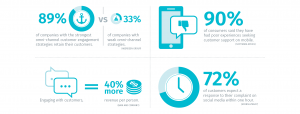Channel marketing is expanding your sales force while still sticking with a customer-based mindset. Channel marketing aims to reach customers at various brand touchpoints and maximize lifetime value. It’s finding partners to distribute your products around different markets and grow your customer base.
If you sell software, a relevant channel could be a laptop retailer. For a jewelry seller selling their products on a TV or YouTube shopping channel in addition to their website, will allow them to reach more potential customers. Your channels could be wholesalers, value-added resellers, retail sales agents, representatives, affiliates, etc.
Benefits Of Channel Marketing
One obvious advantage is selling in more places than your store, meaning more reach and hopefully sales. But it extends past that. These are some other benefits:
Reach Customers Without A Strong Intent To Buy
An HR executive searching on Google for ways to engage employees isn’t actively looking for a product, but for content to help them solve their problem. If that person were to come across an affiliate’s/reseller’s post mentioning your employee engagement and reward platform, that is one possible sale that you would have missed without that channel
Get In-depth Information On Your Customers
A channel can get you more information on your customer’s experience. In some cases, they are closer to your market and are positioned at a point where your customers can objectively talk about your product.
Look at the example I used previously of a laptop retailer and your software. People purchasing laptops and getting that software will freely give their feedback on what they don’t like and a new competitor they prefer; information that they might not give you directly.
Leverage The Power Of Trust To Make More Sales
This benefit is more for products that are not so popular. A new phone brand entering the market is not going to garner the interest of your target market as one already trusted by your market.
To tap into that, you can use sites and people that your customer’s trust, probably due to their reputation of giving accurate and objective comments on things. For example, if you use a retailer selling on Amazon or social media, you’ll be able to leverage the marketplace’s trust factor.
Save On Advertising
You might not have to spend much on promoting your products and services when you have middle people designing their own sales incentives and drawing up personalized experiences to get customers.
Connect With The Right Channels
The first step is creating a channel marketing strategy. Your strategy should aim to create the best way to expose your products and identify the right channels.
Use Research To Identify Channels
To identify the right channels, you have to do some market research. That is, on people and marketplaces that might be able to push your products or services. So, considering which of those (channels) that your target audience frequents is important. Then, check on which your competitions’ products are.
At the end of your analysis, you should know if it’s best to use a direct sales strategy where an in-house sales force pulls it. If you’re relying on this, then understanding the types of online selling channels and the right one for you will help you create marketing programs that grab in sales.
In most cases, multi-channel and in extension, omni-channel works. With more than 73% of consumers shopping on more than one channel, you’ll have to design an excellent omni-channel plan. If you still need more convincing, this stats shows a bit of how much influence a good omnichannel strategy can have and what customers expect.

The other side of the board will be using an indirect sales model. In this case, you will need a knowledgeable person – a marketing manager (or you) – to design partner programs aimed at lead generation.
Here, you can start looking at companies that bundle products together for a complete solution to customers. For example, web development, social media marketing, and content management solutions are all different products that a value-added retailer can sell together.
You might also want to see if affiliate marketing and resellers will do much for your turnover.
Ensure you choose partners that will help you grow. The truth is your marketing channel affects the way your product is sold, and that can rub off on your business. The way your end-customers will perceive your products will be influenced by their experience with your partners. So, choose wisely and carefully.
Convince Potential Partners Of Benefits And Support
Marketing to partners is almost like marketing to your end customers. You have to convince them why partnering with you will benefit them. In the end, everyone is trying to profit from every business move they make.
If you’re crafting a marketing initiative for customers, you have to make one for partners as well. You could offer discounts or access to your technology to convince them. In some cases, training will work. For example, web hosting companies can provide free technical and sales training to resellers.
Another approach can be using your partner’s product as a value-added service to yours. In that case, marketing activities will include not only your product but also that of your partners. What you’re looking at is mutual benefits for both parties.
Conclusion
Success with channel marketing doesn’t end in choosing the right channels. You have to put in efforts to engage those channels if you want them to continue generating leads for you. For in-house, you will need to understand what drives your TA to one channel over another.
Craft and implement strategies that will improve your chances on a channel. If you’re using partners, helping them helps you too because that forges closer ties. If you do something that helps the SEO or Email Marketing of your partner, you have helped your business as well. This is where partner programs come in.